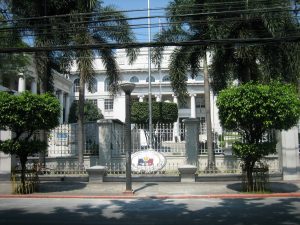The Philippine Supreme Court has ruled that only the Philippines can supervise the exploration of its natural resources, declaring unconstitutional a 2005 agreement between China, Vietnam, and the Philippines to jointly explore for oil in the disputed South China Sea.
The decision by 12 of the court’s 15 justices voided the Joint Marine Seismic Undertaking (JSMU) agreement, which was signed by state-owned companies from the three countries, and came nearly 15 years after the submission of the original petition.
“The Court ruled that the JSMU is unconstitutional for allowing wholly-owned foreign corporations to participate in the exploration of the country’s natural resources without observing the safeguards provided in Section 2, Article XII of the 1987 Constitution,” the Supreme Court said in a statement yesterday.
This section of the Constitution specifies that “the exploration, development, and utilization of natural resources shall be under the full control and supervision of the state.” It also states that Manila “may enter into co-production, joint venture, or production-sharing agreements” for natural resources, as long as 60 percent of the capital is owned by Philippine nationals.
Signed before China asserted its maximalist “nine-dash line” claim to nearly the entire South China Sea, which it formally submitted to a United Nations body in 2009, the 2005 tripartite agreement was in some ways a vestige of a calmer era, when the region’s unresolved maritime and territorial disputes were mostly dormant. At the time, Manila’s relationship with Beijing was in a buoyant state under the administration of President Gloria Macapagal Arroyo, who in 2005 hailed a “golden age” in bilateral relations.
The agreement was nonetheless highly controversial in the Philippines, and building domestic political pressure, along with the deterioration in relations between China and Vietnam, prevented the renewal and extension of the agreement, which expired in 2008.
It was around this time, in May 2008, that lawmakers from the left-wing Makabayan bloc, with support from the National Union of Peoples’ Lawyers, filed a petition seeking to void the JMSU. The petition claimed that the tripartite agreement was unconstitutional because it allowed foreign corporations – in this case, the state-owned China National Offshore Oil Corporation (CNOOC) and Vietnam Oil and Gas Corporation (PetroVietnam) – to take part in the exploration of petroleum resources lying within Philippine waters.
According to the petitioners, around 80 percent of the 142,886-square-kilometer area covered by the agreement lay within the Philippines’ 200-nautical-mile Exclusive Economic Zone. Critics also claimed that the JMSU was “shrouded in secrecy,” and that the CNOOC was the dominant partner in the agreement, taking charge of seismic exploration of hydrocarbon resources in areas where the countries’ claims overlapped.
As detailed in a report from Rappler, Arroyo’s administration responded at the time that the agreement covered pre-exploration activities rather than “the exploration, development, and utilization” of petroleum resources as stated in the Constitution. In its ruling yesterday, however, the Supreme Court dismissed this line of argument, stating that “exploration” pertains to “a search or discovery of something in both its ordinary or technical sense.”
The Supreme Court’s ruling casts doubts over the viability of future joint oil and gas exploration between China and the Philippines. During his state visit to China last week, President Ferdinand Marcos Jr. and Chinese leader Xi Jinping expressed their willingness to revive negotiations for joint oil exploration in non-disputed – which is to say, Philippine-controlled – parts of the South China Sea.
Such agreements would seem to have been greatly complicated by the ruling, to say nothing of any potential Joint Development Agreement between China and the Philippines in waters that are still under dispute. (These would likely also violate the 2016 arbitral award handed down by a tribunal at The Hague, which ruled that China’s “nine-dash line” has no legal validity.)
As a result, the already small possibility that joint resource exploration could serve as a prelude to some kind of settlement between Beijing and Manila, or at least an abeyance of tensions, seems to have narrowed further.

































